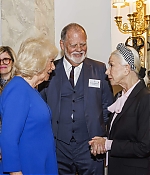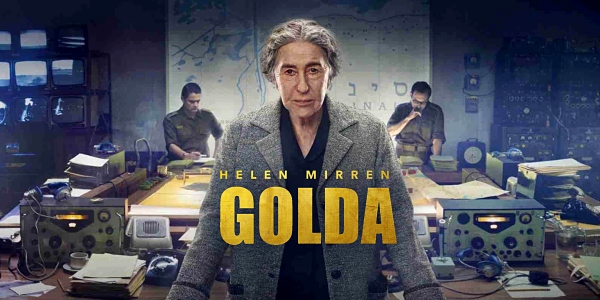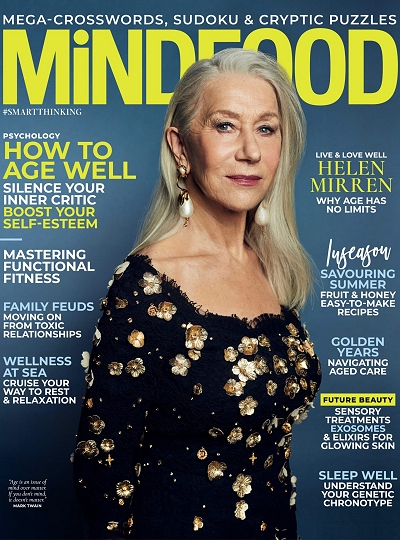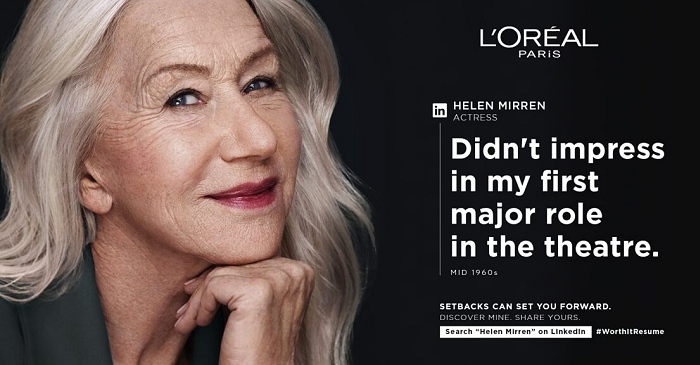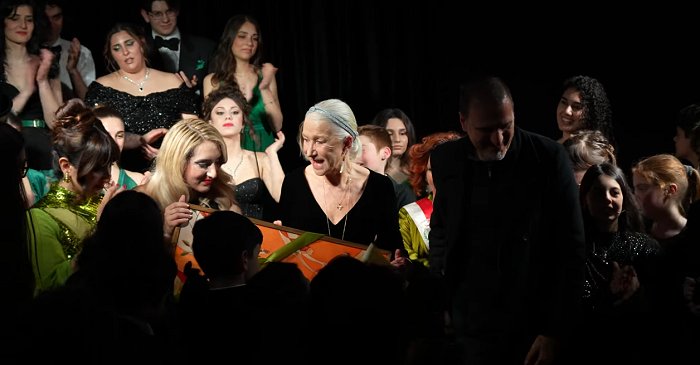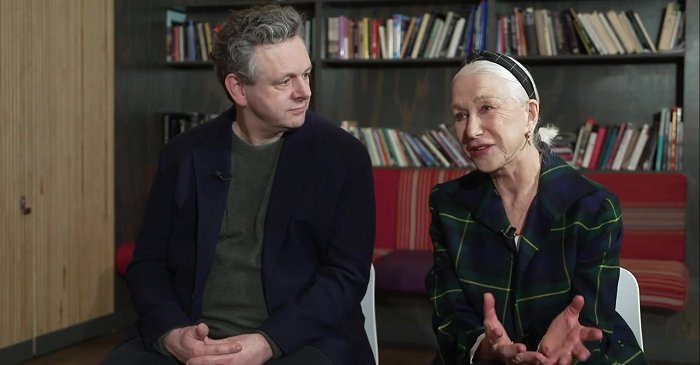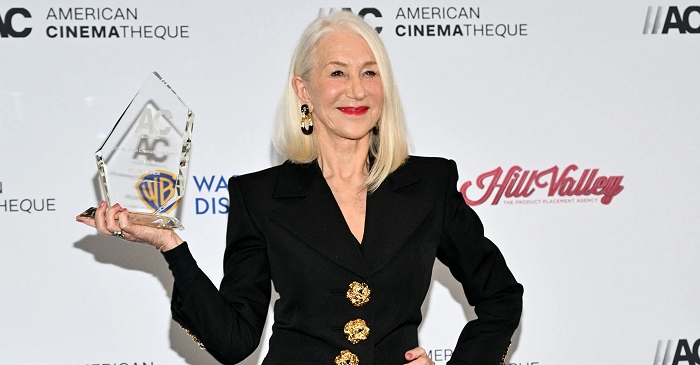
|
Welcome to The Helen Mirren Archives, your premiere web resource on the British actress. Best known for her performances with the Royal Shakespeare Company, "Prime
Suspect" and her Oscar-winning role in "The Queen", Helen Mirren is one of the world's most eminent actors today. This unofficial fansite provides you with all latest
news, photos and videos on her past and present projects. Enjoy your stay.
|
Celebrating
10 years
on the web
|
Helen Mirren’s career as a serious actress has been overshadowed by the kind of media images – “voluptuous”, “sexy” – normally reserved for film stars. She is currently appearing in a play about rape. Julia Pascal talks to her about contradictions.
Helen Mirren lives in a pretty Victorian house in Fulham. She shakes my hand warmly and shows me in. “It’s full of Irish men upstairs,” she tells me and I meet Liam and Tom who are on their way out after morning coffee and a “Dublin gossip”. The phone rings. “You must come and see the show,” she tells the caller, 2and we’ll go out to dinner afterwards. Logan’s, if we can get a table”. The pastel pink room is half her kitchen, half lounge and flower-filled with first night offerings. She’s still high on the excitement of opening American playwright William Mastrosimone’s “Extremities” at the Duchess Theatre. The play deals with an attempted rape on her by a man who has been watching her for weeks. In the first part his attack is brutally realistic, but for the remainder of the play, her character, Marjorie, confronts his violence with her own.
“Extremities” exposes a society which marks the woman as the guilty part when she is raped and criticises “liberal” expectations of democratic justice. Marjorie has no proof of her attack – she is not bruised – and, by maiming her attacker in self-defense, faces the prospect that is is she who is solely to be punished. An extraordinary play for a man to write, “Extremities” has upset most critics from the respectable dailies through to the alternative press. “The City Limits reviewer thinks the play is dangerous,” says Mirren, “but the only danger is that it upsets people’s equilibrium.” For most of the play, Marjorie expresses powerful rage. The vision of a dominant, leading woman in a conventionally staged West End production is certainly unusual. Mirren agrees: “The play shows women doing what they don’t usually do; they are not long-suffering victims or nagging bitches here but, because they are not, this causes great distress. Audiences are used to angry young men, or angry old men but they don’t like angry women.”
Helen Mirren is not an actress who has been strongly identified with the women’s movement in the way that Glenda Jackson has; and her media image of “voluptuous blonde” has confused the issue. So what does she feel about sexual equality in theatre? “The only way we can get there is through rage,” she says, “anger is the dynamo which will bring about change.” And how does she feel about that media image that has haunted a large portion of her acting life? “I went through varying degrees of anger and humour about it,” she says, “but I was always aware that finally my work must speak for me.” Does she think that women are either rewarded or punished for their sexual appeal? She tells of her research into rape cases for “Extremities” and notes that in the US the rapist’s lawyers will fight to have more women on the jury. Ironically, they tend to be harder on the raped woman, whereas the male majority jury feels protective towards her. If women are tougher on their own sex is this because they too are perpetuating the punishment pattern?” We are on dangerous ground here,” Mirren observes. “Maybe the myth of Eden still dominates our ‘civilised’ society: woman is the sinner and must be punished for what man has done to her.”
Helen Mirren’s reputation has been grounded in a decade playing the classics in the Royal Shakespeare Company during the ’70s. Now her Best Actress Award at this year’s Cannes Film Festival for “Cal” has rocketed her into the superstar bracket. Eight years ago, when she joined Peter Brook’s company in Paris, it looked as if Mirren was abandoning her tag of “glamorous actress” in search of some mystical experience. Brooks toured Africa and brought his multiracial troupe into contact with remote tribal rituals; a long way from the RSC production line. Mirren, by abandoning the RSC for Brooks, seemed to be leveling criticism against the conventional institution. “I’d been banging away at the RSC for three or four years,” she says, “and felt that there must be more to life than this. I never felt I was learning anything in those superficially attractive productions. It all felt a bit hollow. But Peter’s company didn’t give me what I thought I would. It was completely divorced from anything else I’d done. Only now, after eight years, does the experience percolate through.” And what was the experience? “Learning not to act. That’s the hardest thing to do. I’m outside English techniques, that’s why I’ve never really been accepted in England as a serious actress.”
As she moves towards her 40s future work may also become a problem. After all English theatre has few parts of note for older women. At 16 she played Cleopatra in the National Youth Theatre and more recently she took on the role again at the RSC. “Early on I got lots of parts and thought it was because I was a brilliant actress. But it’s not true. We’re all puppets of our society. I imagined I’d got all the medals on pure talent, but there’s more to it. I’m aware there’s a danger of becoming vain and silly.” But she’s not short of work… “It’s the kind of work that’s offered which is worrying – I suppose I want the impossible. To play great parts endlessly and I can’t do that here because nobody is writing them. Life is hard and it gets harder,” she says, “unless one says ‘I’ll get married and have lots of children and let some man support me.'” Has she every considered this? “No, I never wanted to marry. It wasn’t because I didn’t like the men I lived with. I just didn’t want to marry them.”
But if it’s hard to find challenging roles when you’ve played all the Shakespeare leads and so few contemporary writers are writing for middle-aged actresses, is it also because the profession is dominated by the male white middle class Oxbridge mafia? “Yes,” she says strongly. “I have never worked with a woman director and I wish I had, particularly when I was starting out. It would have made me a better actress quicker.” Why? “Because the relationship between a young actress and an older, male director is dodgy and the actress is extremly vulnerable to manipulation. It’s not so much to do with the work but with the sexual dynamics of the situation and I think I was wrong-footed as an actress because of that”. Does she think this siutation will change? “Getting to be a director is not to do with being good at the job but to do with hustling and the minute women start hustling in theatre they are considered ‘unattractive’ and are despised.”
She returns to her current play, it is obviously affecting her deeply. There is a point in it where she threatens to castrate her would-be-raper with his own knife nd it is a moment which seems doubly provocative in the plus Duchess Theatre. “There were times in my life,” she says, “when I’ve wanted to say ‘I’ll cut them off you’ to guys. What woman hasn’t? I’ve wanted to do back to men what they’ve done to me. I’ve had sexual assault one way or another. When I walk down the street and there are four guys coming towards me and I know that the next five minutes are going to be mortifying – that too is violence. I’ve though ‘Fuck it, I should be able to walk down the street without this'” I ask if she would think of returning to the RSC. “It’s very glamorous,” she says, “you get to wear all those lovely costumes and the audience thinks you’re great; they don’t really see through the facade. But I do so love all those silks and satins.” Like the camisoles and French knickers she modelled for one of the Sunday colour supplements recently? She laughs. “Yes I know it’s not ideologically correct. But fuck it”!

